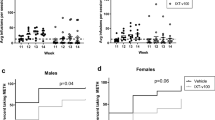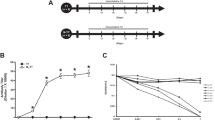Abstract
Rationale
3,4-Methylenedioxypyrovalerone (MDPV) is a synthetic cathinone abused for its cocaine-like psychostimulant effects in “bath salts” products. While there are currently no pharmacotherapies for MDPV abuse, rodent studies suggest immunotherapy may offer a feasible treatment option.
Objectives
These studies tested the capacity of active vaccination to reduce the reinforcing effects of MDPV in Sprague-Dawley rats.
Methods
Rats acquired cocaine self-administration (0.32 mg/kg/inf) on an FR1 schedule. Dose-effect functions for cocaine (0.032–1.0 mg/kg/inf) and MDPV (0.001–0.32 mg/kg/inf) were determined under an FR5 schedule. Rats in the vaccine group were immunized during cocaine self-administration. All rats transitioned to a progressive-ratio (PR) schedule to establish breakpoints for cocaine (0.1–1.0 mg/kg/inf) and MDPV (0.01–0.32 mg/kg/inf). Responding was extinguished, and cue-induced and MDPV-primed reinstatement (0.56 mg/kg, IP) were evaluated.
Results
No endpoints of cocaine self-administration differed between groups, but the ED50 for MDPV self-administration was significantly lower in control relative to vaccinated rats. Under the PR schedule, MDPV was ~ 2.5-fold more potent in maintaining responding in control than vaccinated rats, but Emax was not different between groups. Vaccination did not reduce MDPV-primed reinstatement, perhaps due to a decrease in antibody titer.
Conclusions
Vaccination did not alter acquisition of cocaine self-administration, demonstrating pharmacological selectivity and suggesting that the vaccine did not affect learning or motivation, while effectively reducing the potency of MDPV as a reinforcer. The protective effects of the vaccine were surmounted by large unit doses of MDPV, suggesting maximal efficacy of drug-conjugate vaccines in substance abuse disorders will likely require concurrent behavior modification therapy.





Similar content being viewed by others
References
Aarde SM, Huang PK, Creehan KM et al (2013) The novel recreational drug 3,4-methylenedioxypyrovalerone (MDPV) is a potent psychomotor stimulant: self-administration and locomotor activity in rats. Neuropharmacology 71:130–140. https://doi.org/10.1016/j.neuropharm.2013.04.003
Baumann MH, Partilla JS, Lehner KR et al (2013) Powerful cocaine-like actions of 3,4-methylenedioxypyrovalerone (MDPV), a principal constituent of psychoactive “bath salts” products. Neuropsychopharmacol 38:552–562. https://doi.org/10.1038/npp.2012.204
Baumann MH, Bukhari MO, Lehner KR et al (2016) Neuropharmacology of 3,4-methylenedioxypyrovalerone (MDPV), its metabolites, and related analogs. In: Neuropharmacology of new psychoactive substances (NPS). Springer, Cham, pp 93–117. https://doi.org/10.1007/7854_2016_53
Caine SB, Negus SS, Mello NK, Bergman J (1999) Effects of dopamine D1-like and D2-likeagonists in rats that self-administer cocaine. J Pharmacol Exp Ther 291:353–360. https://doi.org/10.1002/(ISSN)2052-1707
Caine SB, Bowen CA, Yu G, Zuzga D (2004) Effect of gonadectomy and gonadal hormone replacement on cocaine self-administration in female and male rats - ProQuest.
Duryee MJ, Bevins RA, Reichel CM et al (2009) Immune responses to methamphetamine by active immunization with peptide-based, molecular adjuvant-containing vaccines. Vaccine 27:2981–2988. https://doi.org/10.1016/j.vaccine.2009.02.105
Fantegrossi WE, Gannon BM, Zimmerman SM, Rice KC (2013) In vivo effects of abused “bath salt” constituent 3,4-methylenedioxypyrovalerone (MDPV) in mice: drug discrimination, thermoregulation, and locomotor activity. Neuropsychopharmacol 38:563–573. https://doi.org/10.1038/npp.2012.233
Gannon BM, Williamson A, Suzuki M et al (2016) Stereoselective effects of abused “bath salt” constituent 3,4-methylenedioxypyrovalerone in mice: drug discrimination, locomotor activity, and thermoregulation. J Pharmacol Exp Ther 356:615–623. https://doi.org/10.1124/jpet.115.229500
Gannon BM, Galindo KI, Rice KC, Collins GT (2017) Individual differences in the relative reinforcing effects of 3,4-methylenedioxypyrovalerone under fixed and progressive ratio schedules of reinforcement in rats. J Pharmacol Exp Ther 361:181–189. https://doi.org/10.1124/jpet.116.239376
Gummin DD, Mowry JB, Spyker DA et al (2018) 2017 Annual Report of the American Association of Poison Control Centers’ National Poison Data System (NPDS): 35th Annual Report. Clin Toxicol 56:1213–1415. https://doi.org/10.1080/15563650.2018.1533727
Hicks C, Huang P, Ramos L et al (2018) Dopamine D1-like receptor agonist and D2-like receptor antagonist (−)-stepholidine reduces reinstatement of drug-seeking behavior for 3,4-methylenedioxypyrovalerone (MDPV) in rats. ACS Chem Neurosci 9:1327–1337. https://doi.org/10.1021/acschemneuro.7b00510
Marusich JA, Antonazzo KR, Wiley JL et al (2014) Pharmacology of novel synthetic stimulants structurally related to the “bath salts” constituent 3,4-methylenedioxypyrovalerone (MDPV). Neuropharmacology 87:206–213. https://doi.org/10.1016/j.neuropharm.2014.02.016
McClenahan SJ, Kormos CM, Gunnell MG et al (2019) Design, synthesis and biological evaluation of a bi-specific vaccine against α-pyrrolidinovalerophenone (α-PVP) and 3,4-methylenedioxypyrovalerone (MDPV) in rats. Vaccine. https://doi.org/10.1016/j.vaccine.2019.10.008
Miller ML, Moreno AY, Aarde SM et al (2013) A methamphetamine vaccine attenuates methamphetamine-induced disruptions in thermoregulation and activity in rats. Biol Psychiatry 73:721–728. https://doi.org/10.1016/j.biopsych.2012.09.010
Mowrer OH, Jones H (1945) Habit strength as a function of the pattern of reinforcement. J Exp Psychol 35:293–311
National Research Council of the National Academies (2011) Guide for the care and use of laboratory animals, 8th edn. The National Academies Press, Washington, DC
Nguyen JD, Bremer PT, Ducime A et al (2017) Active vaccination attenuates the psychostimulant effects of α-PVP and MDPV in rats. Neuropharmacology 116:1–8. https://doi.org/10.1016/j.neuropharm.2016.12.005
O’Connor EC, Chapman K, Butler P, Mead AN (2011) The predictive validity of the rat self-administration model for abuse liability. Neurosci Biobehav Rev 35:912–938. https://doi.org/10.1016/j.neubiorev.2010.10.012
Orson FM, Kinsey BM, Singh R et al (2008) Substance abuse vaccines. Ann N Y Acad Sci 1141:257–269. https://doi.org/10.1196/annuals.1441.027
Piazza PV, Deroche-Gamonent V, Rouge-Pont F, Le Moal M (2000) Vertical shifts in self-administration dose–response functions predict a drug-vulnerable phenotype predisposed to addiction. J Neurosci 20:4226–4232. https://doi.org/10.1523/JNEUROSCI.20-11-04226.2000
Rüedi-Bettschen D, Wood SL, Gunnell MG et al (2013) Vaccination protects rats from methamphetamine-induced impairment of behavioral responding for food. Vaccine 31:4596–4602. https://doi.org/10.1016/j.vaccine.2013.07.038
Sanchis-Segura C, Spanagel R (2006) Behavioural assessment of drug reinforcement and addictive features in rodents: an overview. Addict Biol 11:2–38. https://doi.org/10.1111/j.1369-1600.2006.00012.x
Schindler CW, Thorndike EB, Goldberg SR et al (2016) Reinforcing and neurochemical effects of the “bath salts” constituents 3,4-methylenedioxypyrovalerone (MDPV) and 3,4-methylenedioxy-N-methylcathinone (methylone) in male rats. Psychopharmacology 233:1981–1990. https://doi.org/10.1007/s00213-015-4057-0
Simmler LD, Buser TA, Donzelli M et al (2012) Pharmacological characterization of designer cathinones in vitro. Br J Pharmacol 168:458–470. https://doi.org/10.1111/j.1476-5381.2012.02145.x
Sivagnanam K, Chaudari D, Lopez P et al (2013) “Bath salts” induced severe reversible cardiomyopathy. Am J Case Rep 14:288–291. https://doi.org/10.12659/AJCR.889381
Sizemore GM, Gaspard TM, Kim SA et al (1997) Dose–effect functions for cocaine self-administration: effects of schedule and dosing procedure. Pharmacol Biochem Behav 57:523–531. https://doi.org/10.1016/S0091-3057(96)00437-6
Somkuwar SS, Jordan CJ, Kantak KM, Dwoskin LP (2013) Adolescent atomoxetine treatment in a rodent model of ADHD: effects on cocaine self-administration and dopamine transporters in frontostriatal regions. Neuropsychopharmacol 38:2588–2597. https://doi.org/10.1038/npp.2013.163
Spiller HA, Ryan ML, Weston RG, Jansen J (2011) Clinical experience with and analytical confirmation of “bath salts” and ‘legal highs’ (synthetic cathinones) in the United States. Clin Toxicol 49:499–505. https://doi.org/10.3109/15563650.2011.590812
Watterson LR, Kufahl PR, Nemirovsky NE et al (2014) Potent rewarding and reinforcing effects of the synthetic cathinone 3,4-methylenedioxypyrovalerone (MDPV). Addict Biol 19:165–174. https://doi.org/10.1111/j.1369-1600.2012.00474.x
Watterson LR, Kufahl PR, Taylor SB et al (2016) Sensitization to the motor stimulant effects of 3,4-methylenedioxypyrovalerone (MDPV) and cross-sensitization to methamphetamine in rats. J Drug Alcohol Res 5:1–10. https://doi.org/10.4303/jdar/235967
Wyman JF, Lavins ES, Engelhart D et al (2013) Postmortem tissue distribution of MDPV following lethal intoxication by “bath salts”. J Anal Toxicol 37:182–185. https://doi.org/10.1093/jat/bkt001
Funding
This research was supported by the National Institute on Drug Abuse DA039195, T32 GM106999, and F31DA046121 to SJM. The studies described in this support were submitted in partial fulfillment of Samantha J. McClenahan’s dissertation: McClenahan et al. (2019) Development and preclinical testing of a 3,4-methylenedioxypyrovalerona-like vaccine in rats. Doctoral dissertation, University of Arkansas for Medical Sciences, Little Rock, AR.
Author information
Authors and Affiliations
Contributions
The manuscript was written through contributions of all authors. All authors have given approval to the final version of the manuscript. Participation in research design: SJM, MGG, WEF, and SMO. Conducted experiments: SJM and MGG. Performed data analysis: SJM and WEF.
Corresponding author
Ethics declarations
Conflict of interest
The authors declare that they have no conflict of interest.
Additional information
Publisher’s note
Springer Nature remains neutral with regard to jurisdictional claims in published maps and institutional affiliations.
Rights and permissions
About this article
Cite this article
McClenahan, S.J., Gunnell, M.G., Owens, S.M. et al. Active vaccination reduces reinforcing effects of MDPV in male Sprague-Dawley rats trained to self-administer cocaine. Psychopharmacology 237, 2613–2620 (2020). https://doi.org/10.1007/s00213-020-05558-0
Received:
Accepted:
Published:
Issue Date:
DOI: https://doi.org/10.1007/s00213-020-05558-0




